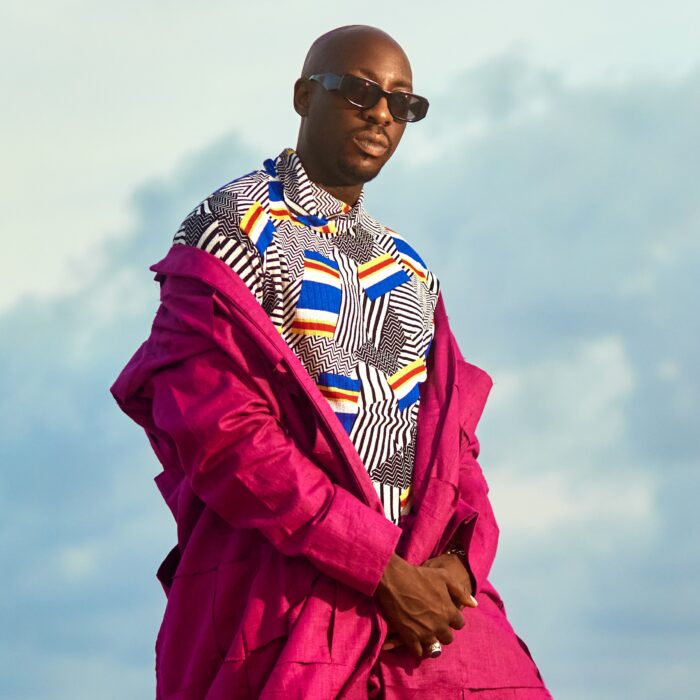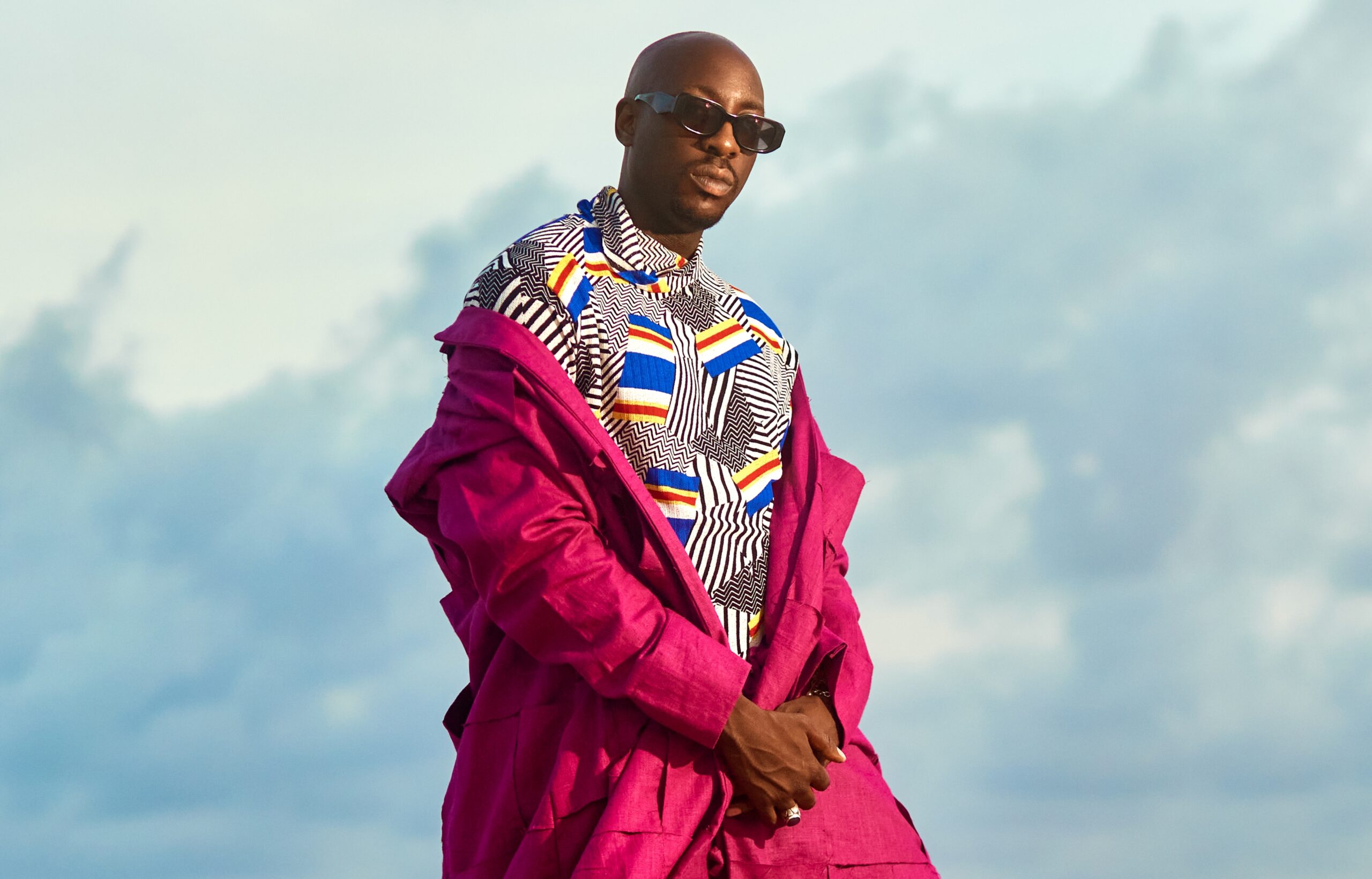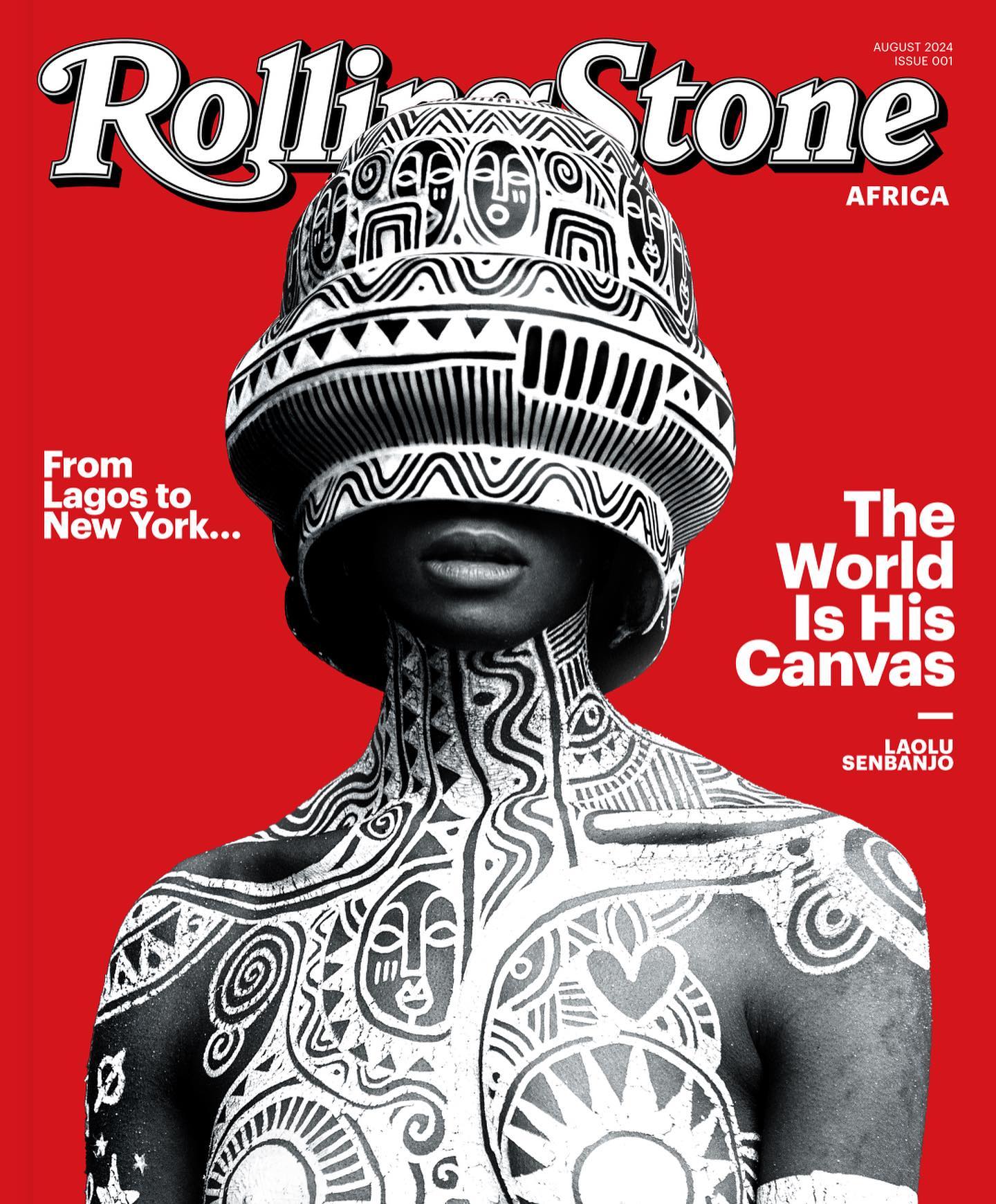


Bien’s influence on the African music industry cannot be overstated. As part of Sauti Sol, he played a pivotal role in putting Kenyan music on the global map. The group’s eclectic sound—blending afrobeat, traditional Benga music and R&B—made them a powerhouse, earning them international recognition. Now, as a solo artist, Bien continues to push boundaries, showcasing the diversity of African music on a global stage.“The world is looking at Africa,” he tells RSA, and he’s determined to show its myriad sounds and stories through his work. The multi-award-winning artist has carved out a name for himself not only as a vocalist, but also as a creative force deeply rooted in African culture.
Reflecting on his solo journey, Bien admits the transition from Sauti Sol wasn’t easy. “When I officially left the group, I didn’t expect to feel that lonely,” he confesses. Used to being surrounded by his bandmates both on and off the stage, he initially struggled with solitude. However, this period of self-reflection has helped him grow both as a person and as an artist. “I’ve been able to discover who I am on stage, build my stamina, and have the autonomy to curate my aesthetic,” he says. His evolution is clear, not just in his music, but in his performances, which he describes as more refined and immersive than ever before.
Since stepping away from the group, Bien has taken a deliberate approach to his solo career, focusing on music that speaks to where he is in life. “I don’t have anything to prove anymore,” Bien shares, noting that his latest project draws heavily on his African roots. He’s been recording percussion in his village, crafting songs in his vernacular language, and creating music that he hopes will inspire others to reconnect with their own roots. “I’m using this album to find answers about my past, my people, and where I’m from,” he explains. By delving deep into his identity, he wants his music to serve as a journey for listeners to do the same.
As Bien prepares for his tour, including a highly anticipated sold-out show at London’s prestigious KOKO venue, he’s focused on perfecting every aspect of his live act. From vocal training to rehearsals, he’s leaving no stone unturned in his quest to deliver an unforgettable experience. “These are the days I used to pray for,” he reflects, fully aware of the incredible journey he’s been on and excited for what’s to come.
In an exclusive interview with Rolling Stone Africa, Bien shares the stories behind ten of his most impactful tracks, offering fans a deeper insight into the music that has shaped his career. From his early days with Sauti Sol to his latest solo ventures, these tracks serve as milestones in a career defined by growth, authenticity, and a deep love for African music.
Sura Yako means “your face” in Swahili, and it’s the song that really broke us into the continent. I remember this song changing our lives, like we went from just being a bunch of guys who are, you know, cute singers—to another level. It took us through our first time to Uganda, to Zimbabwe, to deeper into the continent. It was a real blessing to our lives. And it still continues to be; it’s one of my favourite songs to perform, still, just because of the energy it has and the purity of the harmony, and I love the cultural element in this song, too.
“Kuliko Jana” feels like a prayer. We didn’t even know what we were doing when we were writing it, but it’s another one that changed our lives—a song that continues to touch people. It’s also the most viral track I ever did, because every year there’s a virality that comes with it and it’s been sampled countless times. The choir that we sang with in the video is the local high school choir. We had gone back to school because, during that time, there were too many cases of kids burning down dormitories and boarding schools, and we went back to talk to the young kids and we harmonised together, and that moment of harmony went viral globally. So it’s super spiritual for us as well, because we went back to the source of our music, and it blessed us.
“Suzanna” is such a beautiful song because it just pretty much wrote itself. It has a sample… You know, a lot of the music from East Africa is very Rumba-driven, so the song has a sample from a Congolese musician called Tabu Ley Rochereau, who’s from the 1970s. I love the video, too. I think everyone should watch the video. It was shot by one of the best in Africa, Director K, and it’s still one of my favourite songs in the world.
This song is from a jazz EP that I recorded with a friend of mine called Aaron Rimbui. It’s also a Rumba song. In Swahili, it means ‘chic and expensive’, so it’s just about an expensive party. And the poetry in the song is spiritual, because it’s about work; it’s about putting your best foot forward, but most of it is about enjoying your hard-earned money and just dancing your life and your sorrows away. It’s just one of those songs that reminds me of growing up in a room with a dad who’s a room ahead. My dad was a Rumba head, and he played Rumba music in the house all the time. So when I listen to that song, it takes me back to those moments. And I just love tapping into nostalgia. That’s why I always tap into Rumba music because, in my music, I want to give people those feelings of nostalgia all the time.
“Chikwere” is from my album, Alusa Why Are You Topless? I was getting engaged when I made this and I was wondering what I would do because an engagement is a tricky thing: rings are the most expensive rings you’ll ever buy. Your wedding ring is never going to be the same amount of money as an engagement ring, but I bought this ring and I was going to propose to my wife, but I felt like regardless of the size of ring, the only thing I knew I could give her that no other man could give her is a song. So I wrote the song for my wife, and I got engaged. She was my girlfriend then, but now she’s my wife, and the song continues to reveal itself in my marriage, in my life—she’s also my manager now, so everything I speak in that song is what she is.
“Legend” is the intro on Alusa Why Are You Topless? It’s very comical, but it’s just how my mind works. I just love how it’s the intro for all my shows, it’s the intro for my album, and it speaks to the moment where my life was at. I think it’s hella funny! Some of the lyrics in there are hella funny, but spiritual at the same time.
So I recorded this song in London. It was produced by arguably the biggest producer in the world right now, Sammy SoSo. He also produced “Water” and Tyla’s entire discography, and Tyla is killing it right now! We were in the studio cooking up vibes with a bunch of songwriters, and kind of wrote itself. We didn’t struggle, and we cooked the sample from scratch. A lot of people are still asking me where I got the sample from, but we made the sample from scratch—thanks to Sammy SoSo’s genius—and it reminds me of growing up in the ‘90s, the kind of music I used to hear on the radio. When I was younger, there was an artist called Oliver N’Goma who used to really make amazing Afro Zouk music. And so “Ma Cherie” is who I am when I’m in my Oliver N’Goma bag—simple and sophisticated.
“My Baby” is a song that I featured Ayra Starr in. It’s a special song for me because it was one of the first songs we completed for Alusa Why Are You Topless? I still listen to it for fun today. Most artists don’t listen to themselves after the album’s out for over a year, but it’s one of the songs that I really, really just fell in love with. It was also my first song to chart in the UK: No. 8 on the Official Afrobeats Chart, something that no other Kenyan or East African act has ever done before. Ayra is also one of my favourite musicians in the world right now. I love her album! We just got in the studio and made magic. It didn’t take long to record, but the vibes are eternal.
Another one produced by Sammy SoSa, “Lost & Found” is a funny one: when we started working on it in the studio, I didn’t like it because I said I thought the sound was too salty—like I was trying to do my first album, and demons were telling me that I need to break away from that sound a little. But it turned out to be one of the highest streaming songs on the album, and it’s also a song that I really love performing live.
There’s only one Adekunle Gold. He’s like a brother to me—I love him to death. His family is my family, and I love working with him. Remy Baggins and all the producers on this track are some of Africa’s best. On “Wahala”, I’m singing in Luhya, which is my dialect, and I just felt like I tapped into a spiritual place, one that gave me a sense of meaning and direction where I want to take my music to. I invited Remy and the crew to come to the village with me and to start the journey of recording new music with our traditional influences, and we made pure gold.
The 2024 deluxe version of Bien’s album, Alusa Why Are You Topless?, is out now.

© Copyright Rolling Stone Africa 2024. Rolling Stone Africa is published by Mwankom Group Ltd under license from Rolling Stone, LLC, a subsidiary of Penske Media Corporation.
By providing your information, you agree to our Terms of Use and our Privacy Policy. We use vendors that may also process your information to help provide our services.
By registering for our sites and services, you agree to our Terms of Service (including, as applicable, the mandatory arbitration and class action waiver provisions) and our Privacy Policy.
We use vendors that may also process your information to help provide our services.
This site is protected by reCAPTCHA and the Google Privacy Policy and Terms of Service apply.
By providing your information, you agree to our Terms of Use and our Privacy Policy. We use vendors that may also process your information to help provide our services.